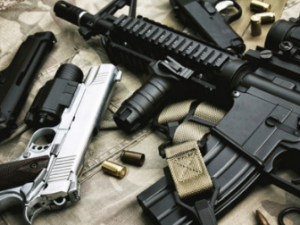One of the greatest crises currently facing the United States — mass shootings — is the focus of new and potentially ground-breaking social science research to be conducted at UC Santa Barbara. The work is expected to yield new knowledge that will inform policymakers, activists and the public at large.
The project “Mass Shootings in America: Men, Masculinity, Guns and U.S. Gun Culture,” by Tristan Bridges, an assistant professor of sociology, is the inaugural awardee of the university’s nascent Pahl Initiative on the Study of Critical Social Issues in the Division of Social Sciences.
“The somber urgency of this topic is beyond question; social science research is essential if we are to understand the plague of gun violence at its roots,” said Charles Hale, dean of social sciences at UC Santa Barbara. “Tristan’s proposal brings a much-needed innovative energy to this research, and his proven dedication as a teacher provides further assurance that the initiative’s goals will be met.”
The Pahl Initiative was borne of the generous and visionary gift of alumni Louise and Stephen Pahl (’77, respectively), who sought to support rigorous social science research on a topic of pressing social importance, involving graduate and undergraduate students, with both scholarly and publicly-facing results. Starting with the 2019-2020 academic year, the initiative will annually select one new proposal — the awards are competitive — for two years of funding.
Hale, who worked closely with the Pahls on the conception of the gift, expressed deep appreciation for their engaged approach to philanthropy. “There is nothing more satisfying than working with donors like the Pahls, who combine such passion and clarity in their deliberations, and whose vision coincides so directly with the mission of our division,” he said.
For his Pahl Initiative project, Bridges will collaborate with cultural sociologist Tara Leigh Tober to recruit a team of undergraduates, who will then work with them to build an expanded data set on mass shooting, to clean that data and to run preliminary analyses. They also expect to support graduate students in the social sciences whose participation in the study would advance their doctoral training.
“This award will allow us to take a more ambitious approach to our mass shootings research,” Bridges said. “We are especially interested in mediated reactions to mass violence — patterns of media responses, ways that different groups of shooters are characterized by the media, how presidents have or have not responded to mass shootings with public statements, etcetera. Pahl Initiative funds will make it possible for us to collect more data on a larger sample of incidents than other scholars have analyzed because of the relatively conservative ways mass shootings have been defined in the research. They also will allow us to support graduate and undergraduate students assisting in this project, as well as to fund a public-facing site to make these data and our findings public so that our work can influence public policy.”
The ways people make meaning from and with guns, Bridges hypothesizes, are deeply entangled with masculinity and gender identity. He plans to access these underlying cultural premises — around masculinity as well as race, political ideology and other factors — by examining news media, political speeches, documents and other materials. The results will help scholars, policymakers and activists alike think more deeply about the enabling conditions of this problem, which might be transformed though education and public discourse, as well as legislative or judicial action.
Once completed, research results from the project will be broadly disseminated by various public means such as op-eds, blogs and white papers, and publishing the mass shooting data set on an open-access portal. Bridges and Tober also aim to forge connections with journalists in hopes of informing their coverage of the topic, and to facilitate briefings with advocacy groups who might glean from the research insights that may be adaptable, and valuable, for long-term strategies.
The scholars hope, ultimately, that their research changes the way gun violence is both discussed and studied, revealing unexplored connections between formations of masculinity and mass shootings. Rates of gun ownership and legal constraints on access are clearly important factors, but the story cannot end there, Bridges’ proposal contends. While the U.S. is not alone in having a lot of guns, what is unique on an international scale is America’s “gun culture.”
“This is a difficult topic,” Bridges said. “Mass shootings happen more in the United States than any other nation in the world. And the best estimates we have shown that mass shootings not only happen more often in the U.S., but that they are increasing in frequency. Mass shootings are related to a variety of social problems in the U.S. rooted in race, class and gender inequality, coupled with our uniquely violent gun culture.
“I hope this work contributes to the larger public conversation about gun violence, gun ownership, and gun culture in the U.S.,” he added. “I hope that this work is part of policy decisions, suggestions and interventions. And I hope that this work helps us better appreciate how gun violence is related to other systems of social inequality in the United States as well.”
Related Link:
News Date:
Thursday, August 22, 2019
August 27, 2019 - 1:48pm







